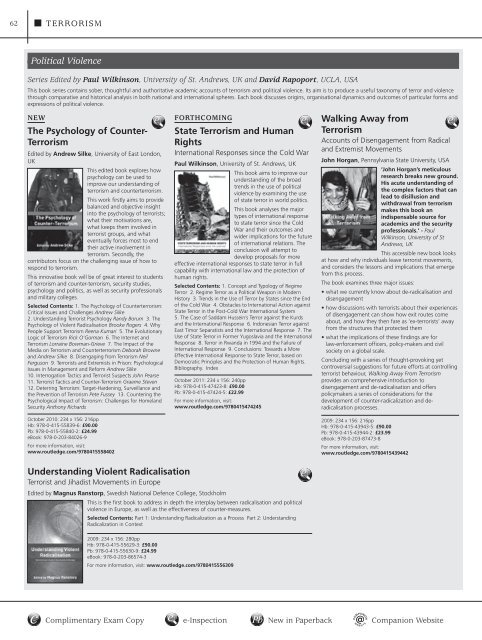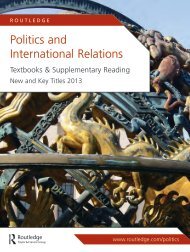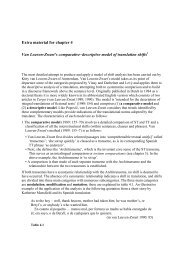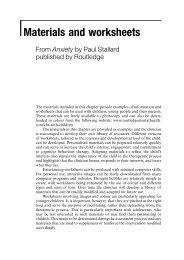Politics and International Relations 2011 (UK) - Routledge
Politics and International Relations 2011 (UK) - Routledge
Politics and International Relations 2011 (UK) - Routledge
Create successful ePaper yourself
Turn your PDF publications into a flip-book with our unique Google optimized e-Paper software.
62<br />
New<br />
terrorism<br />
Political Violence<br />
Series Edited by Paul Wilkinson, University of St. Andrews, <strong>UK</strong> <strong>and</strong> david rapoport, UCLA, USA<br />
This book series contains sober, thoughtful <strong>and</strong> authoritative academic accounts of terrorism <strong>and</strong> political violence. Its aim is to produce a useful taxonomy of terror <strong>and</strong> violence<br />
through comparative <strong>and</strong> historical analysis in both national <strong>and</strong> international spheres. Each book discusses origins, organisational dynamics <strong>and</strong> outcomes of particular forms <strong>and</strong><br />
expressions of political violence.<br />
The Psychology of Counter-<br />
Terrorism<br />
Edited by Andrew Silke, University of East London,<br />
<strong>UK</strong><br />
This edited book explores how<br />
psychology can be used to<br />
improve our underst<strong>and</strong>ing of<br />
terrorism <strong>and</strong> counterterrorism.<br />
This work firstly aims to provide<br />
balanced <strong>and</strong> objective insight<br />
into the psychology of terrorists;<br />
what their motivations are,<br />
what keeps them involved in<br />
terrorist groups, <strong>and</strong> what<br />
eventually forces most to end<br />
their active involvement in<br />
terrorism. Secondly, the<br />
contributors focus on the challenging issue of how to<br />
respond to terrorism.<br />
This innovative book will be of great interest to students<br />
of terrorism <strong>and</strong> counter-terrorism, security studies,<br />
psychology <strong>and</strong> politics, as well as security professionals<br />
<strong>and</strong> military colleges.<br />
Selected Contents: 1. The Psychology of Counterterrorism:<br />
Critical Issues <strong>and</strong> Challenges Andrew Silke<br />
2. Underst<strong>and</strong>ing Terrorist Psychology R<strong>and</strong>y Borum 3. The<br />
Psychology of Violent Radicalisation Brooke Rogers 4. Why<br />
People Support Terrorism Reena Kumari 5. The Evolutionary<br />
Logic of Terrorism Rick O’Gorman 6. The Internet <strong>and</strong><br />
Terrorism Lorraine Bowman-Grieve 7. The Impact of the<br />
Media on Terrorism <strong>and</strong> Counterterrorism Deborah Browne<br />
<strong>and</strong> Andrew Silke 8. Disengaging from Terrorism Neil<br />
Ferguson 9. Terrorists <strong>and</strong> Extremists in Prison: Psychological<br />
Issues in Management <strong>and</strong> Reform Andrew Silke<br />
10. Interrogation Tactics <strong>and</strong> Terrorist Suspects John Pearse<br />
11. Terrorist Tactics <strong>and</strong> Counter-Terrorism Graeme Steven<br />
12. Deterring Terrorism: Target-Hardening, Surveillance <strong>and</strong><br />
the Prevention of Terrorism Pete Fussey 13. Countering the<br />
Psychological Impact of Terrorism: Challenges for Homel<strong>and</strong><br />
Security Anthony Richards<br />
October 2010: 234 x 156: 216pp<br />
Hb: 978-0-415-55839-6: £90.00<br />
Pb: 978-0-415-55840-2: £24.99<br />
eBook: 978-0-203-84026-9<br />
For more information, visit:<br />
www.routledge.com/9780415558402<br />
underst<strong>and</strong>ing Violent Radicalisation<br />
Terrorist <strong>and</strong> Jihadist Movements in Europe<br />
ForthcomiNg<br />
State Terrorism <strong>and</strong> Human<br />
Rights<br />
<strong>International</strong> Responses since the Cold War<br />
Paul Wilkinson, University of St. Andrews, <strong>UK</strong><br />
This book aims to improve our<br />
underst<strong>and</strong>ing of the broad<br />
trends in the use of political<br />
violence by examining the use<br />
of state terror in world politics.<br />
This book analyses the major<br />
types of international response<br />
to state terror since the Cold<br />
War <strong>and</strong> their outcomes <strong>and</strong><br />
wider implications for the future<br />
of international relations. The<br />
conclusion will attempt to<br />
develop proposals for more<br />
effective international responses to state terror in full<br />
capability with international law <strong>and</strong> the protection of<br />
human rights.<br />
Selected Contents: 1. Concept <strong>and</strong> Typology of Regime<br />
Terror 2. Regime Terror as a Political Weapon in Modern<br />
History 3. Trends in the Use of Terror by States since the End<br />
of the Cold War 4. Obstacles to <strong>International</strong> Action against<br />
State Terror in the Post-Cold War <strong>International</strong> System<br />
5. The Case of Saddam Hussein’s Terror against the Kurds<br />
<strong>and</strong> the <strong>International</strong> Response 6. Indonesian Terror against<br />
East Timor Separatists <strong>and</strong> the <strong>International</strong> Response 7. The<br />
Use of State Terror in Former Yugoslavia <strong>and</strong> the <strong>International</strong><br />
Response 8. Terror in Rw<strong>and</strong>a in 1994 <strong>and</strong> the Failure of<br />
<strong>International</strong> Response 9. Conclusions: Towards a More<br />
Effective <strong>International</strong> Response to State Terror, based on<br />
Democratic Principles <strong>and</strong> the Protection of Human Rights.<br />
Bibliography. Index<br />
October <strong>2011</strong>: 234 x 156: 240pp<br />
Hb: 978-0-415-47423-8: £90.00<br />
Pb: 978-0-415-47424-5: £22.99<br />
For more information, visit:<br />
www.routledge.com/9780415474245<br />
Edited by Magnus Ranstorp, Swedish National Defence College, Stockholm<br />
This is the first book to address in depth the interplay between radicalisation <strong>and</strong> political<br />
violence in Europe, as well as the effectiveness of counter-measures.<br />
Selected Contents: Part 1: Underst<strong>and</strong>ing Radicalization as a Process Part 2: Underst<strong>and</strong>ing<br />
Radicalization in Context<br />
2009: 234 x 156: 280pp<br />
Hb: 978-0-415-55629-3: £90.00<br />
Pb: 978-0-415-55630-9: £24.99<br />
eBook: 978-0-203-86574-3<br />
For more information, visit: www.routledge.com/9780415556309<br />
Walking Away from<br />
Terrorism<br />
Accounts of Disengagement from Radical<br />
<strong>and</strong> Extremist Movements<br />
John Horgan, Pennsylvania State University, USA<br />
‘John Horgan’s meticulous<br />
research breaks new ground.<br />
His acute underst<strong>and</strong>ing of<br />
the complex factors that can<br />
lead to disillusion <strong>and</strong><br />
withdrawal from terrorism<br />
makes this book an<br />
indispensable source for<br />
academics <strong>and</strong> the security<br />
professionals.’ - Paul<br />
Wilkinson, University of St<br />
Andrews, <strong>UK</strong><br />
This accessible new book looks<br />
at how <strong>and</strong> why individuals leave terrorist movements,<br />
<strong>and</strong> considers the lessons <strong>and</strong> implications that emerge<br />
from this process.<br />
The book examines three major issues:<br />
• what we currently know about de-radicalisation <strong>and</strong><br />
disengagement<br />
• how discussions with terrorists about their experiences<br />
of disengagement can show how exit routes come<br />
about, <strong>and</strong> how they then fare as ‘ex-terrorists’ away<br />
from the structures that protected them<br />
• what the implications of these findings are for<br />
law-enforcement officers, policy-makers <strong>and</strong> civil<br />
society on a global scale.<br />
Concluding with a series of thought-provoking yet<br />
controversial suggestions for future efforts at controlling<br />
terrorist behaviour, Walking Away From Terrorism<br />
provides an comprehensive introduction to<br />
disengagement <strong>and</strong> de-radicalisation <strong>and</strong> offers<br />
policymakers a series of considerations for the<br />
development of counter-radicalization <strong>and</strong> deradicalisation<br />
processes.<br />
2009: 234 x 156: 216pp<br />
Hb: 978-0-415-43943-5: £90.00<br />
Pb: 978-0-415-43944-2: £23.99<br />
eBook: 978-0-203-87473-8<br />
For more information, visit:<br />
www.routledge.com/9780415439442<br />
complimentary exam copy e-inspection New in Paperback companion Website
















